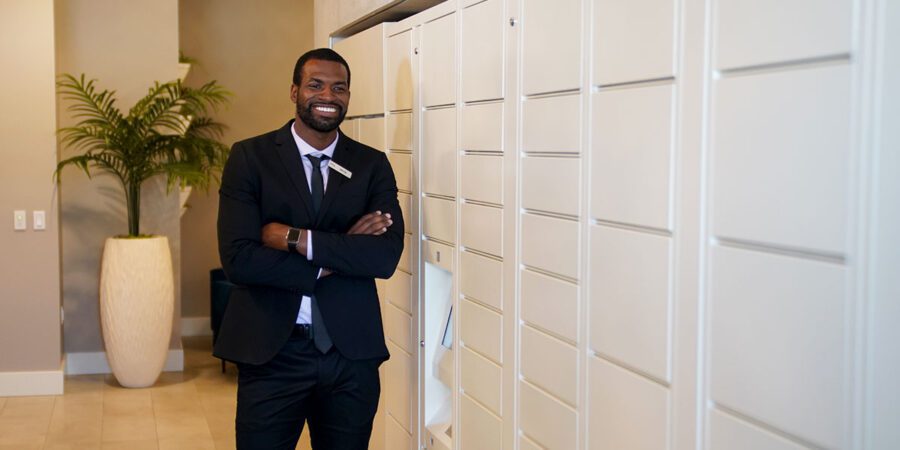
Multifamily
Property Management Budgeting Tips
Written by: Parcel Pending
5 Min Read
Published: August 12, 2019
Updated: March 29, 2023
As a property manager, one of the hardest aspects of the job is searching for ways to maximize your limited budget. Due to the constraints it places upon your ability to properly do your job, you need to find places where you can afford to cut costs or additional ways you can generate revenue, whether directly or indirectly. Whether it be installing an apartment package delivery system to save you time or regular maintenance to avoid a more expensive fix down the road, budgeting tips will be essential.
Are you budgeting strategically? Below, you’ll find budgeting tips and cost-saving opportunities you will want to consider employing. Keep reading to discover what those are.
Property Management Budgeting Tips
As costs rise, properties are no longer guaranteed, high-yield cash flow, particularly for those property managers with little experience or who came into such a role by chance. As margins decrease, budgeting mistakes compound and are magnified, especially when it’s the result of incompetence. Therefore, by taking the time to budget and plan for the future you can accomplish the following:
- Set performance targets
- Make income and expense projections
- Plan for capital improvements
- Identify problems that need addressing
- Create a standard for property management reviews
The following tips should help you avoid potentially ruinous errors:
Budget for both one-time and ongoing costs
As you begin to outline your annual budget, it’s essential that you’re considering all of your potential future costs by budgeting for ongoing costs as well as one-off expenses. Examples of these include:
-
- Ongoing – Leasing, maintenance, on-site management, staff, security, vendors, utilities. Think of your day-to-day operating expenses.
- One time – Repairs, fixing a room for a new resident, replacing parts, or remodeling rooms or parts of the property.
Create a cushion for emergencies
You also need to factor in the chance for not only one time costs, but emergency costs as well. If you do not have room in your budget for emergencies and the like, one disastrous occurrence could be the hole that sinks the ship. Create a budget that has room for random expenses that may arise sporadically. If you don’t end up using that spare cash, you can either roll it over into the next year’s annual budget or use that money to improve the property.
Address small issues immediately
One mistake many property managers make involves allowing small issues to linger, remain unaddressed, and then get worse over time. Often, the excuse made is that fixing something that’s manageable would be a waste of the limited budget. The reasoning goes that there are larger, more costly problems. That said, like an injury, if you let it fester, things only magnify and get worse. A patched pipe costs far less than a total replacement. With that said, you’ll find that the small investment now will save you a lot more money later.
If you run a large property, you might be overwhelmed by the sheer number of issues that require your attention. In such cases, consider splitting issues into three tiers of urgency:
- High urgency – Should be fixed within the same day, if not within the hour.
- Structural Issues
- Mold
- No heat or hot water
- Leaks
- Clogged toilets
- Safety issues
- Medium urgency – Should be addressed within 48 hours.
- Broken appliances
- Clogged shower or sink
- Busted lights
- Malfunctioning AC
- Low urgency – Should be dealt with within a week.
- Leaks
- Drips
- Small holes
- Cracked tile
- Grout coming out
- Bad molding
Look for ways to save by spending
Although it’s counterintuitive, sometimes you have to spend money in order to save it. Similar to repairs, a small upfront investment can increase efficiency that saves you money over time. For example, consider your package management.
If you manage a large multifamily apartment, you’re likely receiving dozens of packages a day from Amazon and the like. Even if you have a mailroom, this constant influx of deliveries takes up your time as you sign for, accept, sort, store, and/or deliver packages to residents. For each package, that’s five to ten minutes of your day that could be more effectively spent elsewhere. It might be time to turn that messy mailroom into a smart package room.
A solution to this problem would be adding smart package lockers such as those made by Parcel Pending. Apartment automation through these electronic lockers would let you stop moonlighting as a postman, saving you hours of time and allowing you to spend your time more wisely. In addition to the time saved, you provide your residents with additional value and contribute to their overall satisfaction with their living situation. These small improvements that you make for your residents’ living situation will make them more likely to remain a resident.
Track your payments
Since budgets need to be adjusted and made on an annual basis, it’s much easier to create a solid budget when you have previous numbers and financial reports to use as the baseline comparison. To make this budgeting process easier, invest time throughout the year to track your current payments and invoices. By organizing and staying on top of your filing, you make the job much more manageable and create increased visibility going forward.
Property Management Budget
Being a property manager is no easy task. That said, it’s easier to handle when you have a comprehensive property management budget. So, as you go about the budgeting process remember the five property management tips for budgeting discussed above:
- Budget current and ongoing costs
- Set aside money for emergencies
- Address small problems before they become larger ones
- Look for areas to invest money, like the mailroom process, in order to save time or money down the road
- Use your ledger and be thorough
By being mindful of your budget and equipping yourself with the right property management tools, you can ensure that your property will continue to thrive even when times get hard!
Sources:
- Banta, T. TBB. Creating an Annual Operating Budget for Your Multifamily Property. https://theresabradleybanta.com/annual-operating-budget-for-your-multifamily-property/
- Manage Casa. 10 Good Ways to Keep Property Management Costs Under Control. (2018). https://managecasa.com/articles/control-costs-permanently/
- Beers, B. Investopedia. 6 steps to a better business budget. (2019). https://www.investopedia.com/articles/pf/08/small-business-budget.asp



